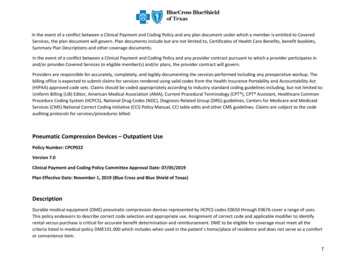
Transcription
Understanding ExocrinePancreatic Insufficiency (EPI)Important Information AboutWhat EPI Is and How It’s ManagedOregon Health andScience University
What IsExocrine PancreaticInsufficiency (EPI)?Who Gets EPI? EPI is related to a few medical conditionsthat affect the pancreas. It can develop insome people who have1,5:–– Chronic pancreatitis (swelling of thepancreas that lasts a long time)–– Cystic fibrosis–– Pancreatic cancer–– Pancreatectomy (an operation toremove all or part of the pancreas)–– DiabetesSTOMACHPANCREASINTESTINESEPI is a long-lasting medicalcondition that affects the pancreas.EPI upsets the way the body breaksdown (digests) food and can causestomach and bowel problems.1-42
How Does EPI Affectthe Pancreas? The pancreas is an organ that makesproteins called enzymes. Theseenzymes help people digest food sothat their bodies can break down andabsorb nutrients, like fat, protein, andcarbohydrates3 When you have EPI, your pancreasdoesn’t make enough enzymes. Thismeans your pancreas can’t breakdown the food you eat, and it can causestomach and bowel problems1-4– You may find that you have diarrheaoften, stools that are oily and smellbad, gas, bloating, and stomach pain.You also may notice that you’re losingweight without knowing whyPeople with EPIcan’t break downthe food they eat,and they havetrouble absorbingnutrients.The Pancreas Has2 Important Jobs6THE EXOCRINE FUNCTIONmakes digestive enzymes to help breakdown food so the body can absorb nutrientsTHE ENDOCRINE FUNCTIONmakes insulin, a hormone that helpsthe body process the sugar we eatSTOMACHPANCREASTO THE INTESTINESIn people with EPI, it is theexocrine function of the pancreasthat is affected. And it is theundigested food moving throughthe intestines that causes theunpleasant symptoms of EPI.3
What Are theSymptoms of EPI?Not everyone with EPI has the samesymptoms. People with EPI may have one,some, or all of the problems listed below1-4:Remember, not everyone withEPI has the same symptoms, sotalk to your doctor about all yourstomach and bowel problems. Diarrhea that happens often–– EPI can cause undigested food to movetoo fast through the stomach andintestines, and this can lead to diarrhea Losing weight without trying–– People with EPI can’t digest and absorbnutrients in the food they eat, and thiscan cause weight loss Oily and bad-smelling stools calledsteatorrhea (stee-at-uh-REE-uh)–– Because people with EPI aren’t able toabsorb all of the fat that they eat, fatfrom their food is passed in their bowelmovements. If you have steatorrhea,your bowel movements can look oily andgreasy. Stools also float, smell reallybad, and are hard to flush. Not all peoplewith EPI have steatorrhea Gas and bloating––Because people with EPI have troubledigesting food, they may feel gassy andbloated Stomach pain–– Gas and bloating from EPI can causestomach pain4
How Is EPI Diagnosed? The symptoms of EPI can be a lot likeother medical conditions that affectthe stomach and bowels.1-4,7-11 This cansometimes make EPI hard to diagnose.That’s why it’s important to be open andhonest with your doctor about all of yourstomach and bowel problems Tell your doctor about:–– Any medical conditions you have–– What types of foods you eat–– Any and all stomach and bowelproblems you have, even if they seemembarrassing–– When your symptoms started–– Any weight you’ve lost–– Any differences in how your stools lookand smell or how often you have bowelmovements–– Any prescription or over-the-countermedicines or herbals you take Your doctor may also:–– Ask you other questions about yourhealth–– Have you fill out a form to help rate yoursymptoms–– Ask you to take a laboratory test todecide if you have EPIOnly a doctor can decide if EPIis the cause of your symptoms.Which DoctorsDiagnose EPI? Only a doctor can decide if EPI is the causeof your symptoms. Your primary caredoctor may be able to diagnose EPI. Or, heor she may ask you to see a specialist If your doctor asks you to see a specialist,it will likely be a gastroenterologist–– Gastroenterologists are doctors whospecialize in medical conditions thataffect the pancreas, stomach, andbowels. They do many of the tests usedto diagnose conditions related to thepancreas, including EPI5
How Is EPI Treated? If you have EPI, your doctor may prescribepancreatic enzyme replacement therapy(PERT) for you. PERT is a medicine thatreplaces the enzymes your pancreas nolonger makes to help you digest your food2 PERT is a medicine that needs to be takenlong term. This means that most patientswith EPI will need to take PERT for therest of their livesHow Do I Take MyPERT?Your PERT dosing is personal. Your doctorwill decide on the right treatment for youbased on your weight and lifestyle. Your dailydose is usually taken with each of your 3meals plus 2 or 3 snacks during the day.13 PERT has to be taken with food to workright. It’s important to take it every dayduring meals and snacks12,13 Along with PERT, your doctor may tell youto make sure that you eat a healthy diet andmay also prescribe vitamins for ou should see your doctor 2 weeks afteryou start taking PERT. Your doctor will askyou about how you have been feeling andwhat foods you have been eating. He or shemay change your dose to make sure it isright for you.13PERT has to be taken with food towork right. It’s important to take itevery day during meals and snacks.12,13Are There Side Effectsof PERT?Each type of PERT has its own side effects.Ask your doctor about the possible sideeffects of your medicine.6
What Else Do I Needto Do if I Have EPI?When you have EPI, it’s very important thatyou take good care of yourself so that youstay healthy. Below are some useful tips tohelp lead a healthier life with EPI. Take PERT the way the doctor tells you12,13–– Take PERT every day during meals andsnacks–– Sometimes your PERT dose may need tobe changed based on your diet, weight,and EPI symptoms. It’s important to tellyour doctor about the types of foods youeat, if you gain or lose weight, and howyou feel at each visit Talk to your doctor about vitamins3–– People with EPI may have problemsabsorbing fat-soluble vitamins such asA, D, E, and K, from their food. Ask yourdoctor if vitamin supplements are rightfor you Eat healthy food1,3–– When you have EPI, it’s hard for yourbody to take in nutrients from your food.That’s why it’s very important to eat ahealthy diet Kick bad habits12–– When you have EPI, smoking tobaccoand drinking alcohol can cause moredamage to your pancreas. All peoplewith EPI should not smoke or drinkIt’s important to tell your doctorabout the types of foods you eat,if you gain or lose weight, andhow you feel at each visit.7
Where Can I LearnMore About ExocrinePancreatic Insufficiency(EPI)?To learn more about EPI, visit the identifyEPIwebsite at www.identifyepi.com. You may alsofind the websites below helpful.American Cancer SocietyPancreatic can Diabetes Associationwww.diabetes.orgNational Pancreas Foundationwww.pancreasfoundation.orgNutrition Advice and on/nutrition-advice-recipes/Be Open and HonestWith Your DoctorPancreatic Cancer Action NetworkPancreatic eatic-enzymes/Although no one likes to talk aboutbowel movements, it’s very importantthat you tell your doctor about all ofyour stomach and bowel problems ateach visit. Don’t be embarrassed—the more you can tell your doctorabout your symptoms, the better heor she can help you manage your EPI.8
References: 1. Domínguez-Muñoz JE. Pancreatic enzyme therapy for pancreatic exocrine insufficiency. Curr GastroenterolRep. 2007;9(2):116-122. 2. Ferrone M, Raimondo M, Scolapio JS. Pancreatic enzyme pharmacotherapy. Pharmacotherapy.2007;27(6):910-920. 3. Fieker A, Philpott J, Armand M. Enzyme replacement therapy for pancreatic insufficiency: present andfuture. Clin Exp Gastroenterol. 2011;4:55-73. 4. Sarner M. Treatment of pancreatic exocrine deficiency. World J Surg.2003;27(11):1192-1195. 5. The Expert Committee on the Diagnosis and Classification of Diabetes Mellitus. Report of the expertcommittee on the diagnosis and classification of diabetes mellitus. Diabetes Care. 2014;37(suppl 1):S1-S154. 6. Management ofduodenal and pancreatic trauma in adults. UpToDate website. denaland-pancreatic-trauma-in-adults?source search result&search endocrine function of the pancreas&selectedTitle 6%7E150.Accessed October 15, 2015. 7. Owyang C. Irritable bowel syndrome. In: Fauci AS, Braunwald E, Kasper DL, et al, eds.Harrison’s Principles of Internal Medicine. 17th ed. New York, NY: The McGraw-Hill Companies; 2008:1899-1900. 8. Signs &symptoms of celiac disease. Celiac Support Association website. http://www.csaceliacs.info/symptoms of celiac disease.jsp.Accessed October 15, 2015. 9. Hows and whys of celiac disease. Celiac Support Association website. http://www.csaceliacs.org/hows and whys.jsp. Accessed October 15, 2015. 10. Friedman S, Blumberg RS. Inflammatory bowel disease. In: Longo D,Fauci AS, Kasper DL, Hauser SL, Jameson JL, Loscalzo J, eds. Harrison’s Principles of Internal Medicine. 18th ed. New York, NY:The McGraw-Hill Companies; 2012:2477-2495. 11. Bacterial overgrowth syndrome. The Merck Manuals website. estinal disorders/malabsorption syndromes/bacterial overgrowth syndrome.html. Accessed October 15, 2015. 12. Lindkvist B. Diagnosis and treatment of pancreatic exocrine insufficiency. World JGastroenterol. 2013;19(42):7258-7266. 13. Use of pancreatic enzyme supplements for patients with cystic fibrosis in the context offibrosing colonopathy. Cystic Fibrosis Foundation website. https://www.cff.org/uploadedFiles/Content/For Caregivers/ClinicalCare Guidelines/Nutrition and GI Clinical Care eplacementMarch-1995.pdf. Accessed October 15, 2015. 2016 AbbVie Inc. North Chicago, IL 60064 853-1834546 January 2016
(PERT) for you. PERT is a medicine that replaces the enzymes your pancreas no longer makes to help you digest your food 2 PERT is a medicine that needs to be taken long term. This means that most patients with EPI will need to take PERT for the rest of their lives PERT has to be taken with food to work right.










